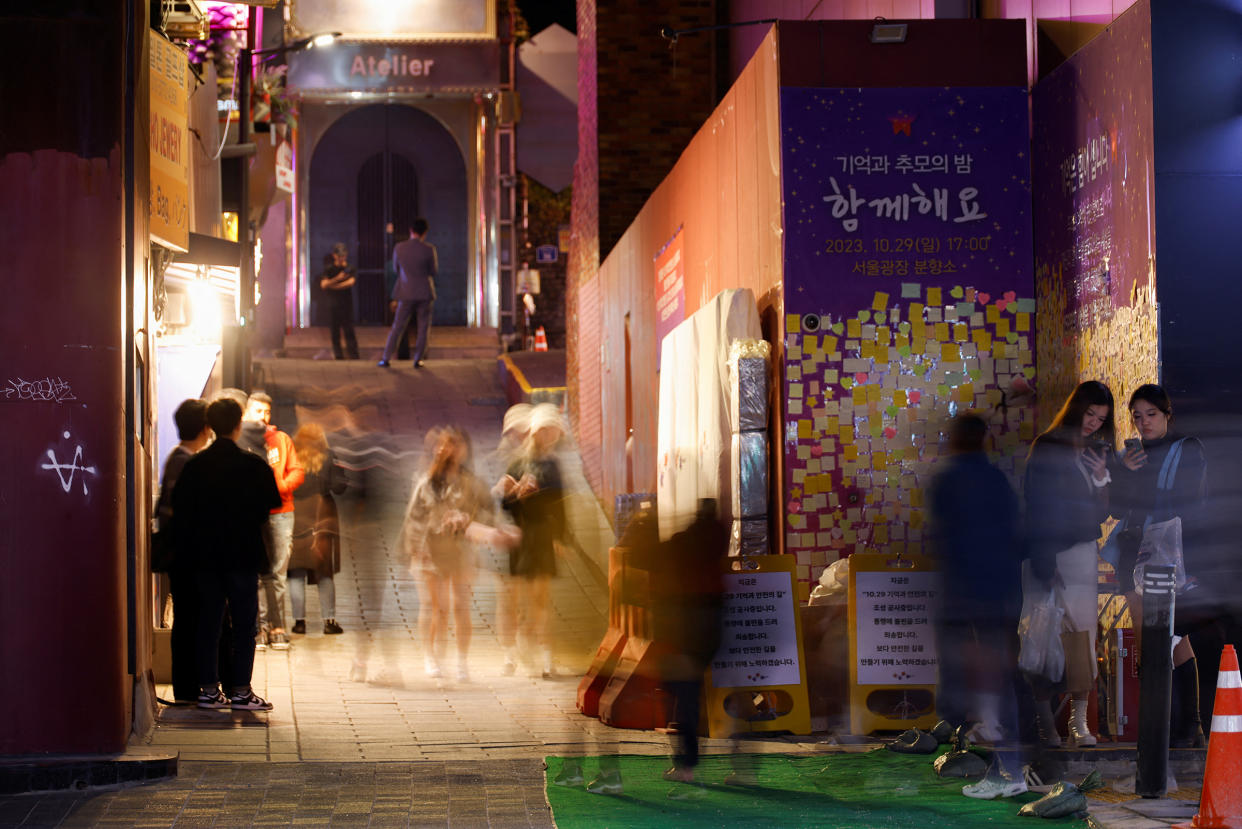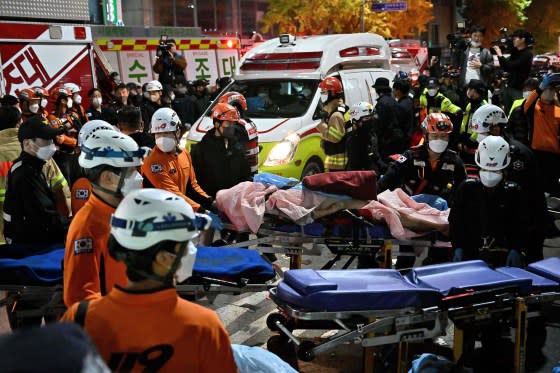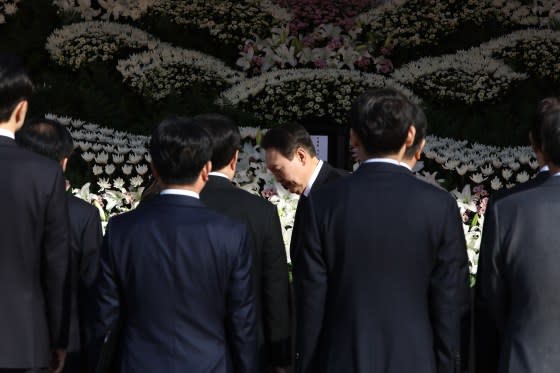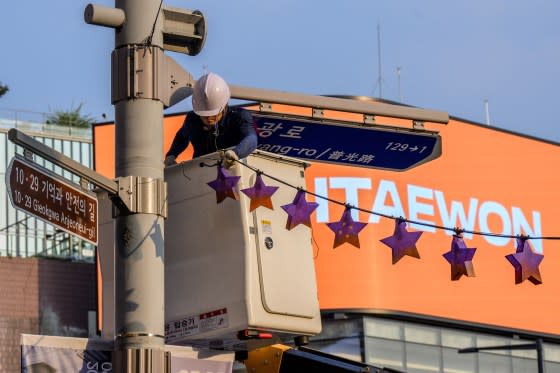‘Nothing Has Changed’: Families of Itaewon’s Crowd Crush Victims Aren’t Ready to Move On

People walk through an alley in Itaewon where the Halloween crowd crush occurred last year, in Seoul, South Korea, on Oct. 23, 2023. Credit - Kim Soo-hyeon—Reuters
One word tore Joung-Joo Choi’s world apart.
He had first heard about crowd trouble in Seoul’s nightlife district of Itaewon on evening news bulletins, but it was a call from his wife that made panic set in. Their 21-year-old daughter, Yujin, had set off to celebrate Halloween in Itaewon last Oct. 29 with a friend, who had phoned to tearfully explain that as the melee grew denser she had lost grip of Yujin’s hand and consciousness soon after.
“After she woke, she had received a call from Yujin’s phone but there was no sound,” recalls Choi. “So she thought that maybe Yujin was injured.”
Choi met Yujin’s friend in front of Seoul’s Hanyang University Hospital at 1:30 a.m. “There were lots of reporters and TV cameras,” Choi tells TIME, standing before an unofficial memorial outside Seoul City Hall for the 159 victims of the Itaewon crush. “There were dead bodies and a lot of confusion.”
After hours of fruitless searching, Choi received a call from a policewoman asking if she was speaking to Yujin’s father. Then came that fated, hated word. “I just heard her say ‘unfortunately…’ and I don’t remember anything after that.”
![Left: Yujin Choi, alongside her parents, on her graduation day at NLCS Jeju in June 2019. Right: Yujin in France in July 2019. “We all love her smile. But we all didn’t know that this photo will be used [for] her memorial alter photo,” says her father Joung-Joo Choi.<span class="copyright">Courtesy Choi</span>](https://s.yimg.com/ny/api/res/1.2/oqDjXNRYKuGxo.PBpLfj3g--/YXBwaWQ9aGlnaGxhbmRlcjt3PTk2MDtoPTc5OQ--/https://media.zenfs.com/en/time_72/96ff5db1db6fb12e6756c29b88819b5f)
Choi was eventually reunited with Yujin in the morgue of a different hospital across the city. He spent the night weeping and stroking her hair. Yujin was a performance studies sophomore at NYU’s Tisch School of the Arts, though she had deferred her studies due to the pandemic, returning to South Korea where, with the grimmest of irony, she believed she’d be safe.
“She loved writing, acting, and music,” says Choi, 54, a media executive. “She played the violin and was just a very positive, outgoing person.”
No father should have to bury his only child, but Choi says the actions of South Korean authorities in the year since have only compounded his sense of grief and loss. While apologies have been issued, nobody has taken responsibility for the disaster, which occurred when an estimated 100,000 revelers converged on a narrow, 45-meter alley that linked a high street metro station entrance with another street packed with bars and restaurants.
“[Officials] try to make it the victims’ own fault,” says Choi. “If they didn’t go there, they wouldn’t have died.”
It was the first virtually unrestricted Halloween festivities since the pandemic, yet only 137 police officers were on duty in the area—compared with 6,500 assigned to monitor a peaceful protest of around 25,000 people against the government of President Yoon Suk-yeol the same night. Just after 10 p.m., the crowds in Itaewon surged in different directions with people losing their footing on the ally’s incline, causing a domino effect and many to be trampled.

Marking the first anniversary of the disaster, on Sunday, parents plan to march from Itaewon to City Hall to mourn together and to demand accountability from the local and central government. They are pushing for a special law to establish a special investigation committee to uncover the truth behind the Itaewon crush, believing that Yoon’s decision to allow the National Police Agency to investigate itself was flawed.
The agency cleared its own top bosses and those at the central government of any wrongdoing. Cases against a dozen local police, fire, and other officials for offenses including negligence are ongoing. “Justice has not been quick,” says Sean O’Malley, a professor and political scientist at Dongseo University in Busan. “That’s very upsetting for parents who want some form of substantial change to safety procedures and how the government handles large scale events.”
Political polarization has also muddled matters. The tragedy was seized upon by the opposition Democratic Party, which tried to elevate the tragedy to the national level and assign blame to the Yoon administration. Lawmakers voted to impeach Interior Minister Lee Sang-min for his alleged role in the disaster only for the decision to be overturned by the Constitutional Court.
The furor fed a heightened climate of revenge politics, where any misstep by a rival party is seen as something to jump on, making officials more wary of taking responsibility, says O’Malley. “People were really upset that the opposition party had played politics with this tragedy.”
In an interview with TIME, Seoul Mayor Oh Se-hoon said one of the causes of the disaster was that the alley was a “CCTV blindspot,” which has now been fixed with extra cameras. In the future, “we will incorporate AI into so-called people-counting CCTVs so they will automatically detect the number of people in crowds,” he says. “I firmly believe that such an accident will not occur again.”
Oh’s use of “accident” is itself telling. The Yoon administration—Oh belongs to the same conservative party as the president—has instructed officials to use “accident” and “deceased” instead of “disaster” and “victims” when referring to the tragedy.

For Choi, the shirking of official responsibility is bad enough—but the insidious descent into victim-blaming betrays a callousness that’s almost impossible to comprehend.
Itaewon was spawned as a bawdy nightlife district adjacent to the U.S. military barracks, whose carousing GIs inevitably lent a reputation for sleaze and debauch. Though the barracks have long gone and Itaewon has since gentrified into some of Seoul’s priciest real estate, replete with cocktail bars and churrasco joints, an association with sybarites persists, especially amongst the older generation. When the crush occurred, city officials either overtly or obliquely began propagating the notion that the revelers themselves must have been at fault, having overindulged in drink or drugs or otherwise ignored the obvious danger signs.
“They say they went there for ‘fun’—drinking, drugs,” Choi says. “It’s such a strange response. People didn’t get to hear how important, how brilliant, how shining these young people were.”
The dodging of official responsibility is sadly all too common in South Korea, where politically appointed officials are protected by an entrenched hierarchical culture. In July, 14 people died when over a dozen vehicles including a bus were swamped by a flash flood in a tunnel south of Seoul, despite warnings about the incoming bad weather for days. In August, the World Scout Jamboree had to be evacuated due to a heatwave, sewage spills, and flooded tents. In both cases, officials failed to heed warnings, but no political bigwigs faced censure.
Instead, the imperative of the business and political classes is to move on. South Korea is aiming to attract 30 million foreign visitors by 2027, capitalizing on a global K-Culture buzz that is sweeping the world, from pop sensations Blackpink to the Netflix hit show Squid Game. In this context, dwelling on the Itaewon crush is bad for business.

Today, the site of the crush is marked by a purple notice board where well-wishers leave heartfelt notes in over a dozen languages. Meanwhile, outside City Hall, the small, makeshift shrine with photos of the mostly young victims, flower tributes, and somber classical music has been hit with escalating fines amounting to tens of thousands of dollars.
“If they had consulted with the Seoul Metropolitan government before installing the shrine, it would not have been a problem,” shrugs Oh. “But according to Korean law it’s illegal that’s why we fine them.”
This year’s Halloween celebrations will be a very subdued atmosphere with few decorations and fewer parties. Police have instructed Itaewon bars to keep their doors shut and not allow patrons to spill onto the street. Still, none of half-down business owners near the crush alley agreed to interviews when approached by TIME. “It’s not good for business,” one said. “We want to move on.”
For Choi and the other relatives, it’s not that simple. For want of a proper investigation, Choi spends his spare time conducting his own by examining bodycam footage supplied unofficially by sympathetic lawmakers. He hopes to learn more about Yujin’s fate and a tragedy that his government appears desperate to forget. “Nothing has changed,” he says. “The same disasters happen again and again in Korea.”
Write to Charlie Campbell at charlie.campbell@time.com.

